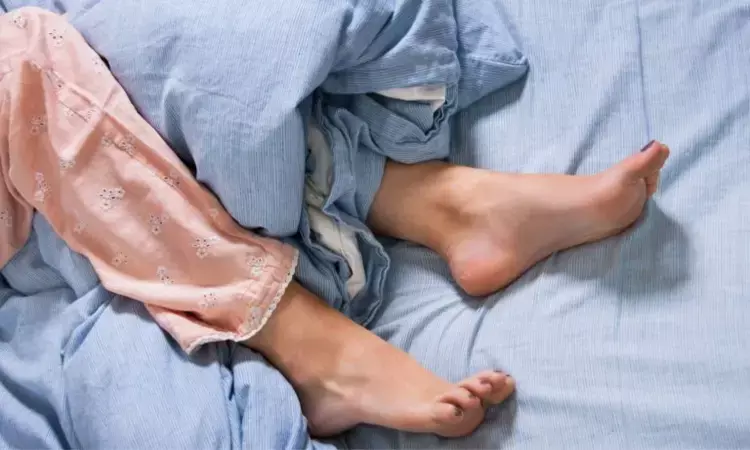- Home
- Medical news & Guidelines
- Anesthesiology
- Cardiology and CTVS
- Critical Care
- Dentistry
- Dermatology
- Diabetes and Endocrinology
- ENT
- Gastroenterology
- Medicine
- Nephrology
- Neurology
- Obstretics-Gynaecology
- Oncology
- Ophthalmology
- Orthopaedics
- Pediatrics-Neonatology
- Psychiatry
- Pulmonology
- Radiology
- Surgery
- Urology
- Laboratory Medicine
- Diet
- Nursing
- Paramedical
- Physiotherapy
- Health news
- Fact Check
- Bone Health Fact Check
- Brain Health Fact Check
- Cancer Related Fact Check
- Child Care Fact Check
- Dental and oral health fact check
- Diabetes and metabolic health fact check
- Diet and Nutrition Fact Check
- Eye and ENT Care Fact Check
- Fitness fact check
- Gut health fact check
- Heart health fact check
- Kidney health fact check
- Medical education fact check
- Men's health fact check
- Respiratory fact check
- Skin and hair care fact check
- Vaccine and Immunization fact check
- Women's health fact check
- AYUSH
- State News
- Andaman and Nicobar Islands
- Andhra Pradesh
- Arunachal Pradesh
- Assam
- Bihar
- Chandigarh
- Chattisgarh
- Dadra and Nagar Haveli
- Daman and Diu
- Delhi
- Goa
- Gujarat
- Haryana
- Himachal Pradesh
- Jammu & Kashmir
- Jharkhand
- Karnataka
- Kerala
- Ladakh
- Lakshadweep
- Madhya Pradesh
- Maharashtra
- Manipur
- Meghalaya
- Mizoram
- Nagaland
- Odisha
- Puducherry
- Punjab
- Rajasthan
- Sikkim
- Tamil Nadu
- Telangana
- Tripura
- Uttar Pradesh
- Uttrakhand
- West Bengal
- Medical Education
- Industry
Psoriasis Patients Face Increased Risk of Restless Leg Syndrome: Study

A recent study published in the Clinical, Cosmetic and Investigational Dermatology journal revealed a significant link between psoriasis and restless leg syndrome (RLS). The findings highlight that patients with psoriasis are more likely to experience RLS, which exacerbates their condition by worsening sleep quality, impairing daily life, and increasing disease severity.
The research from March to July 2024 involved a total of 212 participants, where 106 patients diagnosed with psoriasis and 106 healthy controls. Using standardized diagnostic tools, the study found that RLS was far more prevalent in psoriasis patients than in the general population.
According to the International Restless Leg Syndrome Study Group (IRLSSG) criteria, RLS was diagnosed more frequently in the psoriasis group than in the healthy controls. The patients with both conditions reported poorer sleep, as measured by the Pittsburgh Sleep Quality Index (PSQI), and experienced a substantial reduction in their quality of life, evaluated through the Dermatology Life Quality Index (DLQI).
Also, the severity of psoriasis was assessed using the Psoriasis Area and Severity Index (PASI), with results indicating that the patients who also suffered from RLS had significantly more severe psoriasis symptoms. The study observed a strong positive correlation between PASI scores and the severity of RLS which meant that as the psoriasis worsened, RLS symptoms became more intense.
The patients with co-existing psoriasis and RLS underwent greater difficulty maintaining restful sleep and reported a heavier burden on their everyday activities. Poor sleep quality is already a common concern for those with psoriasis, but the presence of RLS compounds this issue, making it even harder to achieve restorative rest.
This disrupted sleep cycle further impacts the quality of life, increasing fatigue, emotional distress, and overall discomfort. The study underlined how the combined burden of these conditions can create a vicious cycle, where worsening psoriasis aggravates RLS and vice versa.
Given these significant findings, the study emphasizes the importance of early screening for RLS in patients with psoriasis. By using the IRLSSG criteria, physicians could detect and address RLS symptoms early, improving patient outcomes. Timely intervention may help break the cycle of worsening symptoms and improve both physical and psychological well-being.
Overall, these findings advocate for incorporating RLS screening into routine care for psoriasis patients, particularly in Asian populations where data on this co-occurrence has been limited. Such proactive measures could lead to better sleep, improved disease management, and improved overall quality of life.
Source:
Nguyen, C., Nguyen, N., & Van, T. (2025). Restless legs syndrome in psoriasis: A multicenter study on its prevalence, severity, and impact on patients. Clinical, Cosmetic and Investigational Dermatology, 18, 367–378. https://doi.org/10.2147/ccid.s502902
Neuroscience Masters graduate
Jacinthlyn Sylvia, a Neuroscience Master's graduate from Chennai has worked extensively in deciphering the neurobiology of cognition and motor control in aging. She also has spread-out exposure to Neurosurgery from her Bachelor’s. She is currently involved in active Neuro-Oncology research. She is an upcoming neuroscientist with a fiery passion for writing. Her news cover at Medical Dialogues feature recent discoveries and updates from the healthcare and biomedical research fields. She can be reached at editorial@medicaldialogues.in
Dr Kamal Kant Kohli-MBBS, DTCD- a chest specialist with more than 30 years of practice and a flair for writing clinical articles, Dr Kamal Kant Kohli joined Medical Dialogues as a Chief Editor of Medical News. Besides writing articles, as an editor, he proofreads and verifies all the medical content published on Medical Dialogues including those coming from journals, studies,medical conferences,guidelines etc. Email: drkohli@medicaldialogues.in. Contact no. 011-43720751


